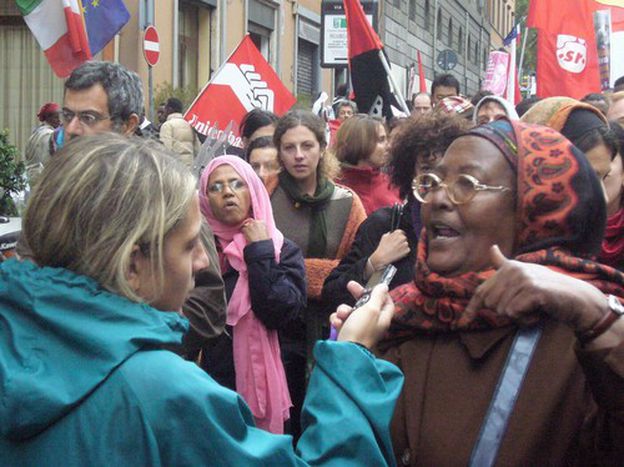
Take back your Portuguese worker: how racist is Europe?
Published on
Translation by:
Astrid vWA homeless Indian man burnt alive in a station in Rome, strikes launched by English workers worried about their jobs - news buzzes reveal how much racism still lurks in Europe
It’s not just a rough impression; two studies, one American and the other European, have come to the same conclusion. Racism is becoming an everyday subject in European politics, and ill-treatment and racist crimes seem to be tolerated more and more. In spring 2008 the Pew Centre, an independent American research centre, questioned 4, 700 people in six European countries to find out their perception of Jews and Muslims. Everywhere the figures are increasing, sometimes reaching more than 50% of those with unfavourable opinions toward minorities.
Consequences of terrorism
Growing islamophobia, for example, could be the result of anti-terrorist politicians who, in the spirit of the people, link islam with terrorism. On 3 February 2009, the German government is answering to the UN human rights council following Iran’s condemnation of the 'dramatic rise' in criminal offences against foreigners in the country.
Moving on to Spain; after the attacks in Madrid in 2005, the anti-muslim Spanish population grew from 37% to 60% before coming back down to 52% in 2008. At the same time the proportion of people with an unfavourable opinion on Jews in Spain went from 21% in 2005 to 46% in 2008.
Tensions caused by rising unemployment

In England at the end of January, it was the tensions in the world of work, brought about by the economic crisis, which brought fears about foreigners to resurface. In England, workers in the energy sector mounted spontaneous and illegal strikes to protest against Total’s employment of almost 500 Portuguese, Spanish and Italian immigrant workers, which provide much cheaper labour than locals. The movement was localised, only to spread like wildfire. Today it involves 3, 000 workers spread over twelve of the country’s energy sites. The strikers have taken on the British extreme right’s slogan: British jobs for British workers. The last group of Portuguese workers to have been hired went back home under pressure from the protesters on 5 February 2009.
'Clearly it’s a worrying question in terms of freedom of movement, which is one of the fundamental EU rights'
In Ireland as well, the economic crisis strengthens protectionist reactions. Unemployment has almost doubled in under a year, reaching 8.3% of the working population. Irish anger is directed on the country’s primary immigrant population: the Polish, over 250, 000 of whom have come to work in Ireland over the last twenty years. Tomasz, interviewed by French newspaper Le Monde, said: 'The Irish have a grudge against us for taking jobs, for looking for jobs and for living off benefits.'
In these cases of social tensions 'several factors come into play,' says Georgina Siklossy, who looks after communications for the European network against racism (ENAR), which itself has compiled 25 national reports on racism in Europe. 'For example, the question of ‘social dumping’ poses itself. Clearly it’s a worrying question in terms of freedom of movement, which is one of the fundamental EU rights,' she continues. It will have to be seen what will become of these phenomenon if the crisis is prolonged.
The case of the Roma people
It is impossible to paint a picture of the racism in Europe without bringing up the question of Roma gypsies, the biggest ethnic minority in Europe. Following pressure from NGOs, the first European summit was dedicated to them in September 2008 to try to find solutions to the discrimination which they suffer. This summit revealed more than anything the deep disagreements between different groups. Fingers are pointed directly at the politics of Italian prime minister Silvio Berlusconi, notably because of his project to record the fingerprints of the entire Italian gypsy population.
The media hype over news bulletins about this community stirs up mass hysterical reactions. On 10 May 2008, after the supposed kidnapping of a new-born by a young gypsy girl, some individuals set fire to a travelling camp in retaliation. In the face of this situation, the exodus of the Roma community into other member countries has been more noticeable in the last few months. On the whole, it’s the EU migratory policies, namely the returns directive and the detention conditions of illegal immigrants, which are criticised by migrant aid societies. Christian Delarue, member of MRAP (the movement against racism and for friendship between peoples) condemns a 'state xenophobia', which 'creates, fosters and propagates the fear of foreigners' through the bias between others from restrictive migratory policies. A 'fortified Europe' has borders that are increasingly difficult to cross, and which stigmatises foreigners.
Translated from Emploi, immigration, discrimination : l’Europe est-elle raciste ?



